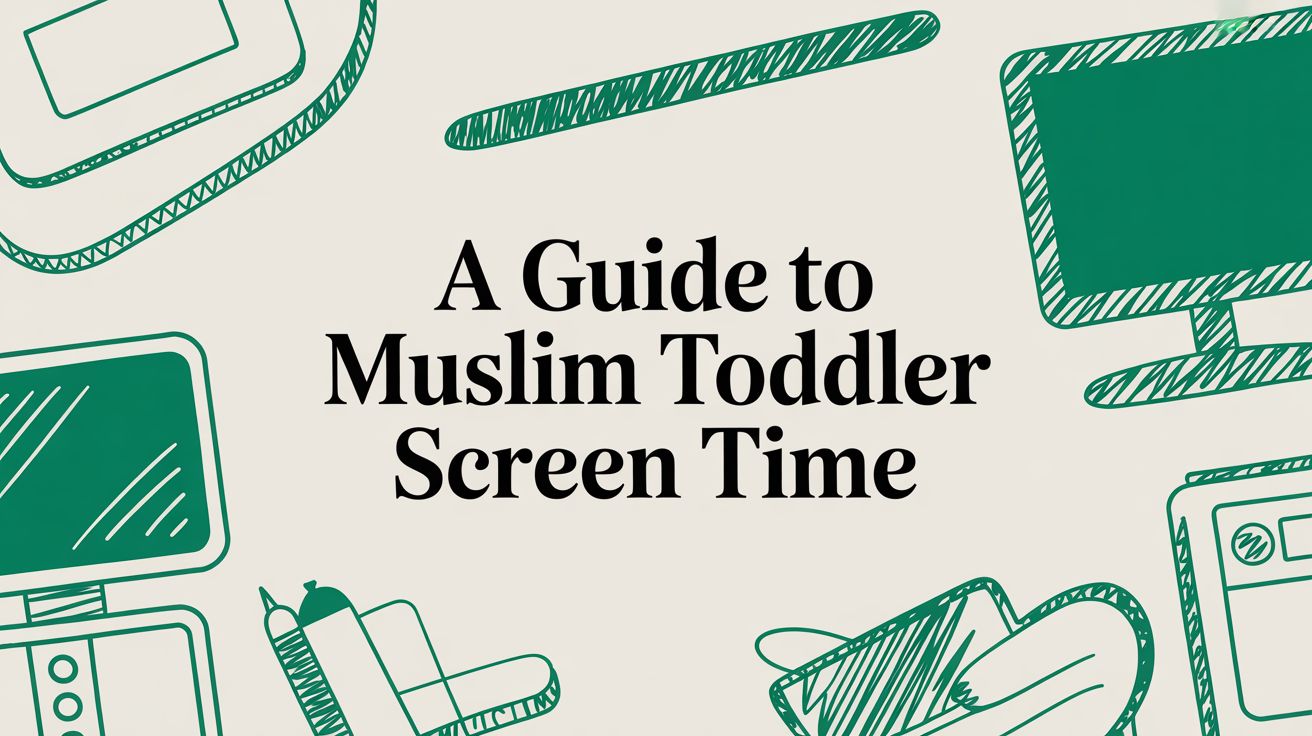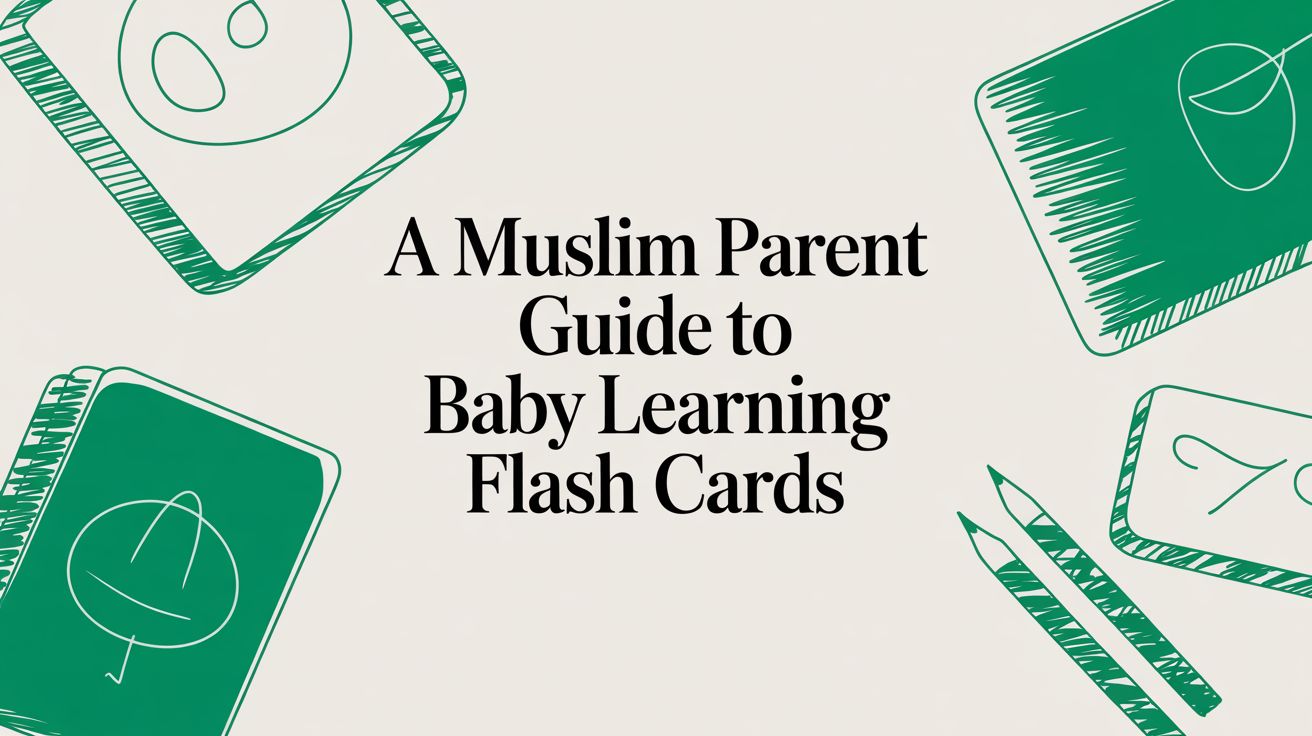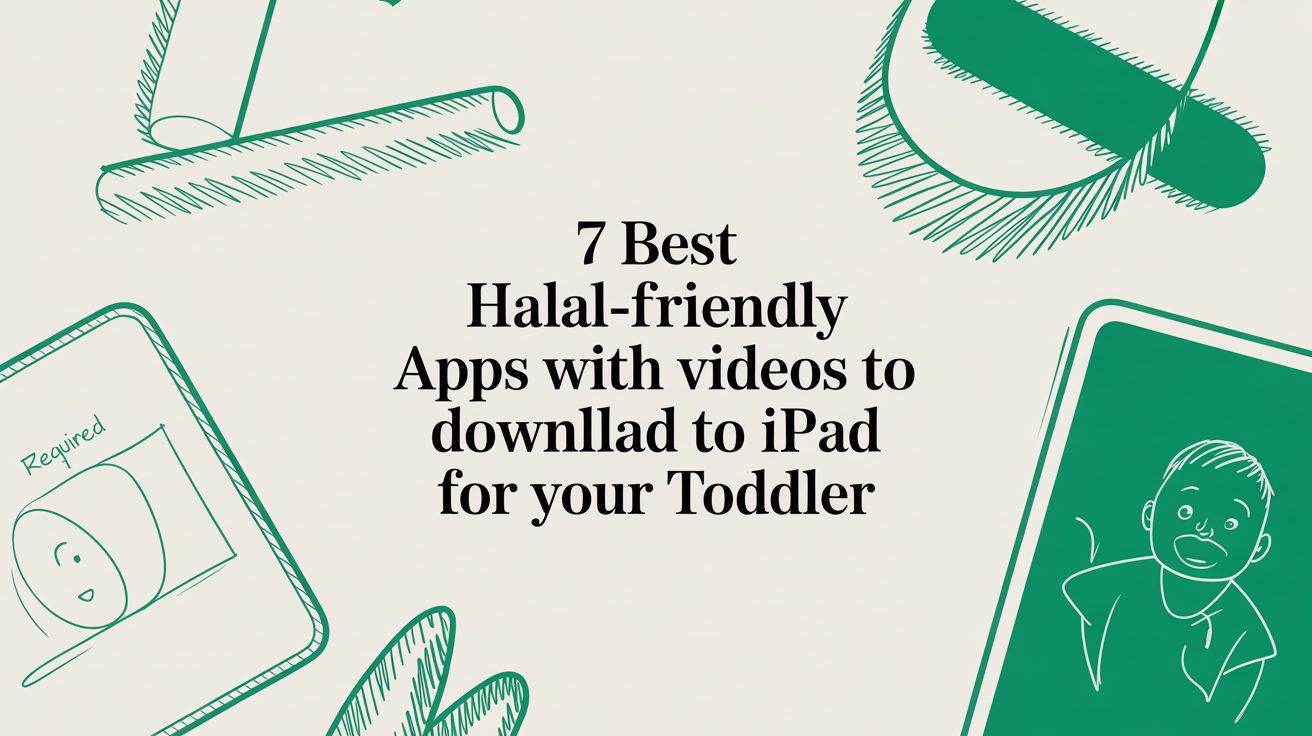Let's be real—managing screen time for a toddler can feel like a monumental task. You're trying to get dinner on the table before Maghrib, find a quiet moment for Salah, or just catch your breath for five minutes. In those moments, a screen can seem like a lifeline. This guide isn't here to lay down impossible rules or add to your guilt. Think of it as a reassuring chat about navigating screen time in a way that feels right for your family and aligns with your faith.
We'll walk through how core Islamic principles, like moderation and mindfulness, can actually be your best friends in creating a healthy digital space at home. It’s all about learning to use screens with purpose, making them a tool that serves your family without sacrificing your values.

Finding Balance in a Busy Muslim Home
For Muslim parents, the screen time conversation goes deeper than just developmental milestones. It’s tied directly to our hope of raising children who are calm, thoughtful, and connected to their faith. At the heart of it is the desire to protect their fitra—that pure, innate nature—from the constant noise and overstimulation of modern media.
This is where your intention (niyyah) becomes your most powerful asset. Screens aren't inherently good or bad. It all comes down to how and why you use them.
Here are a few guiding thoughts to shape your approach:
- Mindfulness over Mindlessness: Instead of defaulting to a phone to stop a meltdown, can you use it for a specific, time-boxed activity? This one shift changes screen time from a reactive habit into a deliberate choice.
- Quality over Quantity: Think about it: 15 minutes spent watching a peaceful nasheed about Allah's beautiful creations is far more enriching than an hour of a loud, frantic cartoon.
- Connection over Distraction: When you can, co-watching is a game-changer. Sitting with your toddler transforms a passive activity into a bonding moment. You can point to the colours, repeat the Arabic words you hear, and talk about the good messages together.
The real challenge isn't just counting the hours; it’s about making the minutes count. Our goal is to ensure that any exposure to screens serves a positive purpose, whether it's video-calling Grandma in Lahore or learning about the Arabic alphabet in a gentle, faith-inspired way.
This table summarizes the core principles we'll be exploring throughout this guide, blending developmental science with our Islamic values.
Quick Guide to Faith-Aligned Screen Time for Toddlers (0-3)
| Guiding Principle | What It Means for Screen Time |
|---|---|
| Protecting the *Fitra* | Choose calm, gentle content that nurtures their pure nature, avoiding overstimulating or aggressive media. |
| Moderation (Wasatiyyah) | Follow expert guidelines (under 18 months, avoid screens except for video chat; 18–24 months, very limited co-watching; 2–3 years, up to 1 hour/day). |
| Intention (Niyyah) | Use screens for a specific purpose (e.g., learning, connection), not as a default babysitter. |
| Mindfulness (Muraqabah) | Be present during screen time. Co-watch whenever possible to engage, explain, and bond. |
| Seeking Beneficial Knowledge | Select content that is educational, teaches Islamic values, or develops positive character traits. |
| Guardianship (Amanah) | Recognize that your child's well-being is a trust from Allah. Actively filter and supervise all digital experiences. |
Ultimately, navigating Muslim toddler screen time is an act of love and protection. It's about building a peaceful home where technology has its place but never overshadows the real-world play, family connection, and spiritual grounding that our little ones need to thrive. This guide is here to help you find that beautiful balance, inshaAllah.
How Screens Impact Your Toddler’s Developing Brain
Have you ever wondered why experts and elders so often caution against too much screen time for little ones? It’s not about passing judgment on a busy parent just trying to get dinner on the table before Maghrib. It’s really about understanding the incredible, once-in-a-lifetime growth spurt happening inside your toddler’s brain and how we can best nurture it.

From the moment they're born until around age three, a child’s brain is forming over a million new neural connections every single second. Think about that for a moment. This explosive development isn't fuelled by apps or videos; it's built on real-world, sensory experiences.
It's the feel of a soft blanket, the sound of your voice singing a nasheed, the smell of daal cooking, and the sight of your smile. These simple, everyday interactions are the building blocks for learning, focus, and emotional health.
This lines up beautifully with our Islamic responsibility to protect our children's fitra—their pure, innate nature. Our job as parents is to create a calm, nurturing space where this God-given disposition can flourish without being overloaded.
The Problem with Overstimulation
So, where do screens fit in? The challenge with most digital content is its intensity. Fast-paced cartoons, jarring sounds, and bright, flashing lights can easily overwhelm a toddler's developing nervous system. A screen simply doesn't operate at the same gentle pace as a storybook or a quiet puzzle. It's often too much, too fast.
This kind of sensory overload can show up in a few ways:
- Shorter Attention Spans: When a child’s brain gets accustomed to the instant gratification of a screen, it can make it much harder for them to engage with slower, real-world activities that require patience, like stacking blocks or listening to you read.
- Difficulty with Emotions: An overstimulated toddler is often a dysregulated one. The constant, high-energy input from screens can make it incredibly difficult for them to wind down, process their big feelings, and avoid meltdowns.
- Disrupted Sleep: The blue light from tablets and phones is known to interfere with melatonin, the hormone that tells our bodies it's time to sleep. This can turn bedtime into a battle and rob them of the deep, restorative rest their growing brains and bodies desperately need.
Understanding the 'why' behind screen time limits is empowering. It’s not about deprivation; it’s about intentionally choosing activities that truly nourish your child’s brain and soul, giving them the best possible start.
Finding a Balanced, Faith-Aligned Path
Science is increasingly backing up this cautious approach. One study on screen exposure among pre-school children found that more than one hour of daily screen time was linked to behavioural issues like hyperactivity and tantrums, concluding that the fast pace was simply too much for their brains.
The researchers’ takeaway was clear: for children aged 0–3, the ideal is no screen media at all, or at most, 30 minutes of calm audio content. These guidelines resonate so well with Islamic teachings on moderation and mindfulness, helping us protect our children’s ability to focus and develop a sound moral compass. You can explore more on this topic in a piece from The Muslim Times.
With this knowledge, we can make choices that feel right for our families and our faith. By minimizing screen-based overstimulation, we are actively creating that peaceful environment for their fitra to thrive. We’re choosing three-dimensional play over two-dimensional screens, conversation over cartoons, and real connection over digital distraction.
It's a conscious act of love and guardianship, inshaAllah.
How to Choose Halal and Healthy Content
Okay, so you’ve decided on when and for how long your little one can have some screen time. Now comes the really big question: what should they actually watch? It’s easy to get lost in the endless scroll of kids' shows and apps, but finding something truly wholesome is about more than just finding an Islamic-themed cartoon.
We’re really talking about choosing media that nurtures your toddler's gentle spirit and aligns with the values we hold dear.
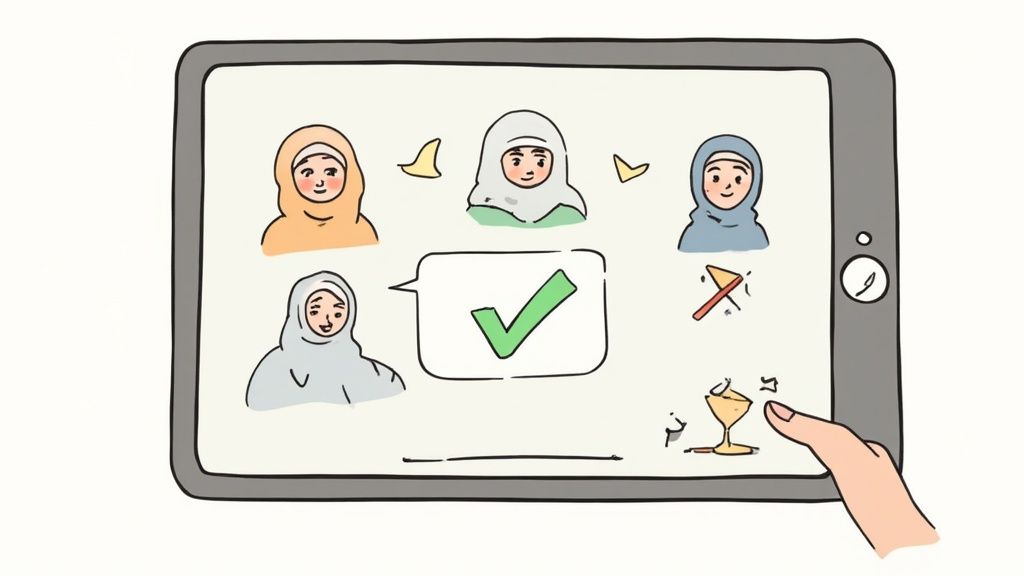
For a toddler, the best kind of content is often the simplest. Their little minds are still developing, and they respond best to calm visuals, gentle sounds, and a slow, predictable pace. It's the difference between a soothing bedtime story and a loud, chaotic circus. The goal is to find content that feels peaceful and leaves your child feeling calm, not completely wired.
This means actively seeking out shows and apps that model the very values you're teaching at home—things like kindness, sharing, patience, and respecting parents. The characters and the stories they tell should reflect the good manners (adab) you practise every single day.
The Good, The Gentle, and The Beneficial
When you're checking out a new show or app, it helps to have a mental checklist. You don't have to find something explicitly "Islamic" for it to be good for your child. In fact, any content that is slow, gentle, and models good character is already beautifully aligned with our values.
Here's what I look for:
- Pacing and Stimulation: Is the show slow-paced, with long, lingering scenes? Or is it all quick cuts, flashy colours, and loud noises? Always, always opt for calm.
- Behaviour Modelling: How do the characters speak to each other? Do they solve problems with kindness and teamwork? This is so important for their social learning at this age.
- Emotional Tone: Does the content feel gentle and reassuring? Or does it rely on yelling, whining, sarcasm, or conflict for entertainment? A positive emotional tone is non-negotiable.
- Commercialism: Let's be honest, is this show just a 30-minute toy commercial? It's best to avoid content that just fuels a "gimme" attitude and instead choose stories that focus on relationships and creativity.
The best muslim toddler screen time isn't just about what's on the screen; it's about how it makes your child feel. We want media that nurtures their fitra (innate goodness), leaving them peaceful and content, not overstimulated and fussy.
A Quick Checklist for Vetting Content
To make it even easier, I've put together a simple table. Think of it as a quick scan you can do before hitting "play."
| Halal-Aligned Content Checklist for Toddlers |
|---|
| Check For |
| Slow pacing, gentle music |
| Kind, respectful language |
| Cooperative problem-solving |
| Positive family dynamics |
| Simple, nature-based stories |
| Modest character design |
This isn't about being overly strict; it's about being intentional. By having these criteria in mind, you can quickly filter out the junk and find the gems.
Red Flags to Watch Out For
Just as important as knowing what to look for is knowing what to avoid. Sometimes, content that seems innocent on the surface can have subtle messages or behaviours you really don't want your toddler imitating.
Be on the lookout for shows that:
- Show kids being disrespectful to parents or elders, even as a joke.
- Normalise hitting, yelling, or unkind teasing between characters.
- Feature characters in immodest or inappropriate clothing.
- Promote family structures or values that conflict with Islamic teachings.
Honestly, one of the best things you can do is build a small, trusted library of pre-approved content. It takes the guesswork and stress out of the equation. Whenever you need to use a screen, you'll have wholesome options ready to go.
And if you're looking for a great starting point, our guide on some of the best Islamic apps for kids has been curated with these very principles in mind. A little prep work here gives you so much peace of mind later.
Finding a Screen Time Routine That Actually Works
Let’s be honest: a healthy approach to screen time for your little one isn’t about following some rigid, unforgiving rulebook. It’s about finding a gentle rhythm that fits into your family's life—one that respects your needs as a parent while protecting your child's well-being. The real goal is to create a predictable flow so that screens have a designated place but don’t completely take over your day.
This requires being realistic. Some days, you'll absolutely need a calm, pre-approved video to keep your toddler safely occupied while you stand for Dhuhr prayer. Other times, a short nasheed in the car on the way to Jummah can be a total lifesaver. What matters most is intentionality. It's about using screens as a specific tool for a specific purpose, not just as a default way to fill time.
Building Your Family’s Screen Time Rhythm
Instead of obsessing over a strict minute-by-minute schedule, try anchoring screen time to specific parts of your day. Toddlers thrive on this kind of predictability. It helps them know what to expect and when.
Here are a few practical ideas of what this could look like:
- The "Mama Cooks" Slot: Allow for 15-20 minutes of a slow-paced, gentle show while you’re busy in the kitchen preparing dinner before Maghrib. You get some focused time, and they get a calm activity.
- The "Quiet Time" Slot: After a busy morning of play, you could incorporate a short, educational video as part of their wind-down routine right before their afternoon nap.
- The "Connection" Slot: Turn screen time into a moment of family bonding by using it for video calls with grandparents or relatives who live far away.
It's just as important to set clear screen-free times and zones. Doing this creates protected moments for genuine connection and free play, reinforcing the idea that screens aren't an all-the-time thing.
A simple household rule like "no screens at the dinner table" or "no screens in bedrooms" can be incredibly powerful. It carves out sacred space for family conversation and peaceful rest—both are essential for a calm Muslim home.
For more ideas on weaving these principles into a balanced day, check out our guide on building a sustainable muslim toddler routine that covers everything from sleep to play.
The Power of Watching Together
One of the best ways to make screen time more meaningful is to simply do it with your child whenever you can. This practice, known as co-viewing, transforms a passive experience into an active and engaging one.
When you watch together, you become their guide. You can pause the video to talk about what’s happening, connecting what they see on screen back to your family’s values and faith in simple, understandable terms.
Here’s how you can turn co-viewing into a beautiful learning opportunity:
- Reinforce Islamic Concepts: If a story features animals, you might say, "Look at that beautiful cat! SubhanAllah, Allah made so many amazing creatures."
- Build Vocabulary: Point to things on the screen and name them. This is a great chance to use both English and any other languages you speak at home, like Arabic or Urdu.
- Model Good Manners: When a character says "please" or "JazakAllah Khair," you can repeat it with a smile and praise their good adab.
This simple act of sharing the experience turns screen time from a solo distraction into a moment of connection. It gives you the chance to filter content in real-time, explain ideas, and reinforce the lessons you’re already teaching at home, making every moment count, inshaAllah.
Practical Tips for Setting and Keeping Boundaries
Let's be honest, this is often the hardest part of the entire muslim toddler screen time conversation: actually turning the screen off without a meltdown. The goal isn't just to end the activity, but to do it with the gentleness and consistency that our faith teaches—rooted in principles like patience (sabr) and compassion (rahmah). This approach helps your toddler feel secure and guided, not punished.
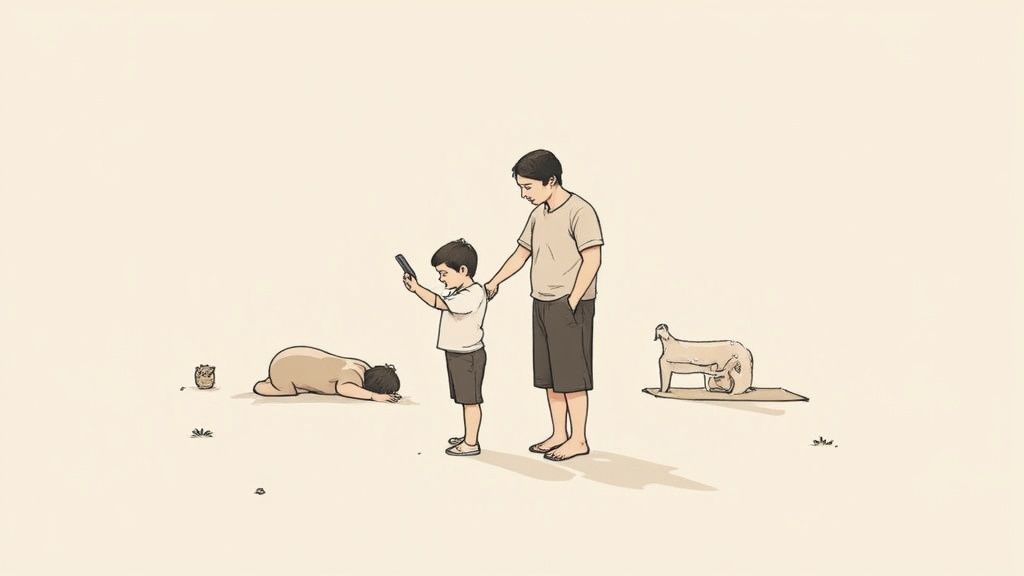
The secret is making the transition predictable. Toddlers have no real concept of time, so a sudden "Time's up!" feels jarring and unfair to them. What works much better is giving them gentle, clear warnings they can actually understand.
For instance, try saying, "We have five more minutes with the nasheeds, and then it's time to put the tablet away for our storybook." I've found that using a visual timer is a game-changer; it gives them a concrete way to see time passing, which makes the end feel less like a surprise.
Gentle Phrases for Smooth Transitions
Before you even mention turning off the screen, get down on their level. Make eye contact, use a calm, loving tone, and connect with them emotionally first.
Here are a few phrases that have worked well for our family:
- "That was a lovely video about the letter Alif! Now, it's time to say ma'a salama (goodbye) to the screen."
- "One more minute, sweetie. When the timer beeps, let's put the phone away together."
- "I know you love this show. We'll finish this part, and then we'll get ready for your bath."
It's completely normal for them to be upset—they're toddlers, after all! Acknowledge their feelings with empathy. "I see you're sad the video is over. It's okay to feel sad. How about we go build a huge tower with your blocks now?" This simple act validates their emotions while still holding the boundary firm.
You Are Their Role Model
Our little ones are always watching, absorbing everything we do. The most powerful way to teach healthy screen habits is to model them ourselves. If we're constantly scrolling through our phones during playtime or at the dinner table, our words about limits will mean very little.
Make a conscious effort to put your own phone away during family time. Let them see you reading a book, engaging in a hobby, or just being present with them. Your actions speak volumes, showing them that life is rich and fulfilling far beyond a screen.
Confidently sticking to your family’s rules is an act of love. It provides the consistency and predictability that toddlers need to feel safe and understand the world around them.
The challenge is real. A study on screen exposure among pre-school children highlighted that many young children exceed recommended limits, which is linked to behavioural issues and language delays—concerns that resonate deeply with Muslim families who prioritise early literacy and a wholesome upbringing.
Navigating different rules with well-meaning family and friends can also be tricky. It's perfectly okay to politely and firmly state your family's approach. A simple, "We're trying to keep his screen time very limited right now, so we'd prefer to play with his toys instead, JazakAllah Khair," usually does the trick. For more specific ideas, our guide on finding halal content on YouTube Kids offers some great strategies. Remember, your consistency is your child's greatest asset.
Got Questions About Toddler Screen Time? We Have Answers.
Let's be honest: figuring out Muslim toddler screen time can feel overwhelming. You’re not alone if you feel a little lost trying to blend modern parenting with your deeply held Islamic values. Below are some straightforward answers to the questions we hear most often from parents in your shoes.
Is It Really That Bad for a Baby Under Two to Use Screens?
Medical experts and child development specialists generally agree: it's best to avoid screens for little ones under two. But we all know real life happens. Sometimes, you just need five minutes to get through the nursery run with your older child.
If you find yourself in that spot, the key is to be interactive and intentional. A video call with grandparents who live halfway across the world? That’s connection. That’s a beautiful use of technology.
If you do need to use media, stick to something very short and slow-paced, like a gentle nasheed video, and—this is crucial—watch it with your child. It's about making it a brief, shared moment, not a go-to distraction.
What’s the difference? It all comes down to purpose. A five-minute video call to connect with family is a world away from habitually handing over a phone to stop a tantrum. Being intentional protects your child's brain development while still giving you a little grace in your day-to-day.
How Can I Keep My Toddler Busy During Prayer Times Without Screens?
Trying to find your khushu in Salah with a busy toddler around is a challenge every parent understands. One of the most effective things I've seen is creating a special "Salah Box."
Find a small basket or box and fill it with quiet, engaging toys that only come out during prayer time. Think soft felt books, chunky wooden puzzles, or even just some colourful stacking rings. The novelty makes it special, and it helps your child build a positive, peaceful association with your prayer routine.
Another simple but powerful idea is to lay out a small prayer mat for your toddler right beside yours. They might just sit on it, or they might try to copy your movements. Either way, it includes them in this beautiful act of worship, teaching them from the very beginning that Salah is the heart of your home.
What’s the Best Way to Handle Grandparents or Relatives Who Let My Toddler Watch Inappropriate Content?
This is a tricky one, and it can feel so awkward. But remember, protecting your child's spiritual and mental well-being is your amanah (trust) from Allah. You can absolutely be firm while still being kind and respectful.
Try a gentle approach first. You could say something like, “Aunty, we’re being really careful about what he watches right now while he’s so little. Would it be okay if we put on one of his shows instead?”
A great tip is to have a few of your approved videos pre-downloaded on your phone. It makes it super easy for them to just say yes. Staying consistent is what truly matters—it sends a clear message and helps you build the healthy media environment you want for your child, inshaAllah.
At Babymode, we're creating a screen-time solution that gives you complete peace of mind. Our halal, ad-free platform will feature AI-generated stories and nasheeds, all carefully reviewed to align with Islamic values and be developmentally appropriate for ages 0–3. You'll be able to set limits, track what they watch, and finally give your child a safe space to learn about their faith. Join the Babymode waitlist for early access and special launch pricing.
